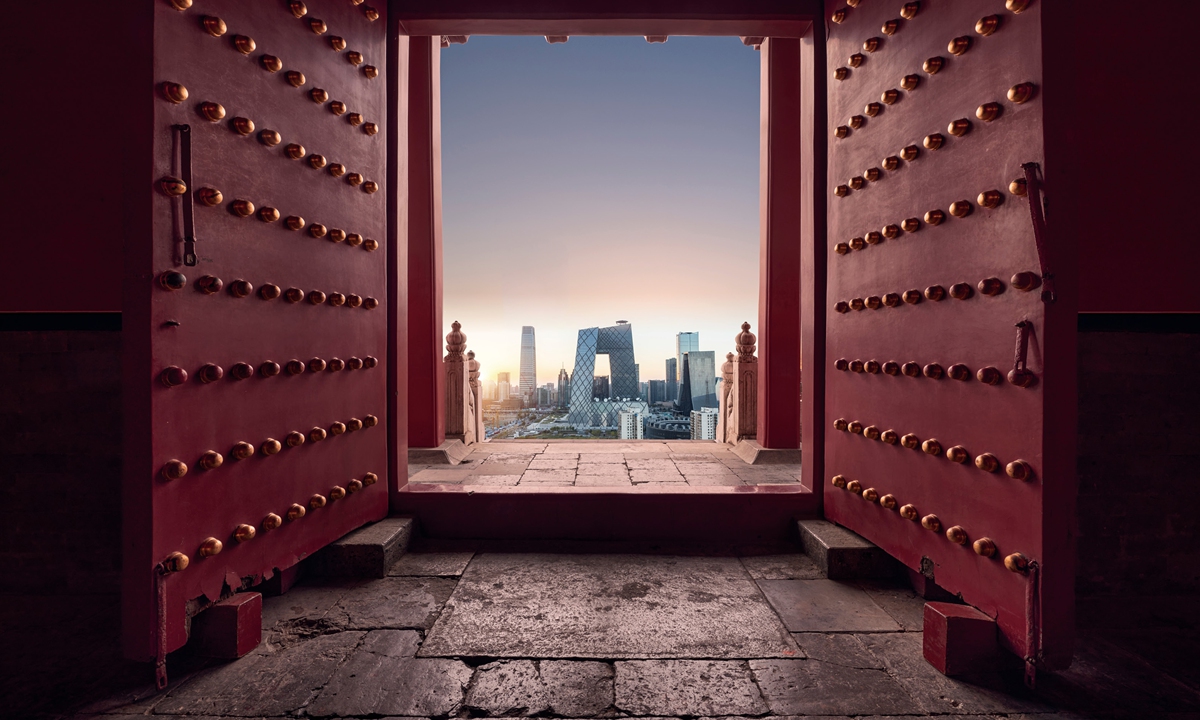
Illustrator: Liu Xidan/GT
The Sixth Plenary Session of the 19th Central Committee of the Communist Party of China (CPC) mirrors the fundamental differences between systems of China and the West. It also magnifies the widening gap of development between the two."Every Party member should bear in mind what the Party is and what its mission is," reads the Communiqué of the Sixth Plenary Session. For whom is the CPC striving for? The answer is always: "the people." This is also the driving force for China's development led by the CPC. We might also ask: For whom are Western political parties serving? The answer is also quite obvious: capitalists.
Despite these facts, China's governance is still being accused by the West from time to time. When seeing China's miracle of long-term social stability continuing, they are eager to jump to conclusions about authoritarianism, centralism and autocracy, without ever understanding China's political system.
China does have overall planning and designs. But the decisions are never made by one person alone, but a group of policymakers. China's concentration of power is based on high-quality democracy.
China is promoting whole-process democracy. For instance, the National People's Congress and its Standing Committee have set up over 20 contact stations across the country to facilitate lawmaking to keep the public better informed about China's legislative process as well as to gather public opinions about draft laws and annual legislative plans. In drawing up the proposals for the 14th Five-Year Plan (2021-25), the CPC has collected over 1.1 million pieces of public advices. The process witnessed full participation of the people. China's major policy decisions are the result of the combination of top-level design and the people's will. These policies, once carried out, will go through efficient implementation as they are widely supported by the people.
China's democracy is high-quality democracy with a goal to best serve the interests of the vast majority of people. It is completely different from how Western parties serve their so-called majorities. Take Brexit as a glaring case in point. Once 51.9 percent people voted to leave the EU, the will and pursuit of the 48.1 percent was crushed like a snap of fingers. Scenarios like this will never occur in China. If nearly half of Chinese people are against something, it will surely not be pushed forward.
People often say having the right to cast votes is everything in Western democracy. A more precise description might be: In the West, the focus of democracy is only about the generation of ruling power, or in other words, about picking the president. After the election, people have basically no say in how the new administration governs the countries. If the government performs badly, they can only hope to pick another one in the next election. They use their veto to show democracy. Unlike China, which democracy is constructive and takes long-term interests into considerations.
The biggest challenge of the Western system is severe political polarization. Elites are treating politics as a market and voters as customers. Everything politicians say and do is it to win votes. Thus, they are often trapped by short-term interests, turning a blind eye to long-term profits for their countries.
The result is quite obvious. Western democracy has been stuck in a mess in recent years. In some countries, there are frequent and fierce political infightings and widening social rifts. Money politics has distorted public opinion, making elections an exclusive show of the rich. Politicians of different parties are in a stalemate about an increasing number of major public issues. They can do nothing as they are all busy attacking one another. The entire social governance is mired in the mud of inefficiency and incompetence.
When some Western countries only take the so-called freedom into account, they have failed to keep a well-mannered social order. When it comes to the epidemic prevention and control, they have failed to coordinate the rule of law, the social order and the freedom of individuals. In terms of development, they can hardly take care of the interests of people, resulting in severe polarization between the rich and the poor and various social conflicts. "Surging prices, a labor shortage and a gummed-up supply chain are making Americans uneasy," the CNN reported last week, not to mention its growing number of gun violence and stunning number of COVID death.
As China rises, it is also reining in the virus, boosting people's living standards, eliminating poverty. Meanwhile, the West is facing various development predicaments and frequent economic challenges. In the long run, the contrast will get more obvious.
The CPC is called a party, but it is totally different from Western political parties. It is a real vanguard of the Chinese nation, the guardian of the overall interests of the people and the country. It is a public instrument that offers restrictive competition mechanism. It is a new form of human political civilization.
(Fan Peng, a research fellow at the Institute of Political Sciences, the Chinese Academy of Social Sciences.The views expressed in this article are those of the author and do not represent those of the platform.)






